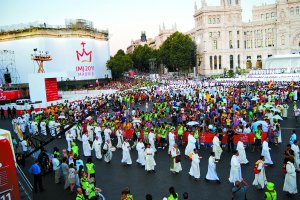In 2005 I produced a number of leaflets - The Living Truth series - which covered a variety of themes. Fr John Edwards SJ wrote an excellent leaflet on the theme of grace. I include the text of this leaflet here:
"The life of Grace is absolutely vital for intelligent living in this life and to getting to heaven and avoiding going to a place where all good is rejected - hell - in the next. It is the most important gift I could ever have, and its loss would be the greatest disaster. Christianity is nearly incomprehensible if we do not know about it.
Grace is a supernatural share in the life of God himself. It is already the life we need to live in heaven; it is the equipment we need to endure, let alone enjoy, never ending Goodness, Truth and Beauty, outside space and time, for all eternity. It is a share in the life of Jesus, earned for us at a great cost when he died on the cross.
Grace enables us to enter and enjoy heaven (Without it we would find it un-endurable - it would in fact be hell because we wouldn't have the right tools and equipment.) Right now, every single action we do draws from the Heavenly Father a "reward". This we receive in heaven. From God's point of view it is important that we are in a state of Grace, because if we are filled with grace we can help to make heaven a reality here on earth.
The Scriptures say a lot about Grace. It's bad to try to argue from "proof texts"' but here are some basic thought-provokers: "I am the Way, the Truth and the Life", "no man can enter into the Kingdom of God unless birth comes to him by water and from the Holy Spirit", "if anyone eats my flesh and drinks my blood, he lives in me, and I in him", "he has chosen us out, in Christ ... marking us out ... to be his adopted children through Jesus Christ."
We receive Grace normally through baptism. We lose it through mortal sin (that is, if we give full and deliberate consent to something against God's law in a serious matter, something that seriously rejects love and goodness.) We regain it through a deep love-sorrow, which is God's gift. This love-sorrow is always given if we receive the Sacrament of Absolution properly; this refers to the reality of being forgiven of our wrongs when we receive this sacrament through the heands of a Catholic priest.
Do we feel the presence of Grace? Not normally. Do only Catholics have Grace? No, otherwise only Catholics would get to heaven. But Grace certainly comes in some way through the Church - which is of course Christ's Body.
There is much more that we can say about Grace, but notice two things especially. First, the life of Grace comes through the gift of Jesus; it is a share in his own life. And he got his life from Mary - that was the way God planned it. Mary is not worshipped, but honoured by Catholics and has a vast part to play in our own state of Grace, in receiving it and in keeping it."





















